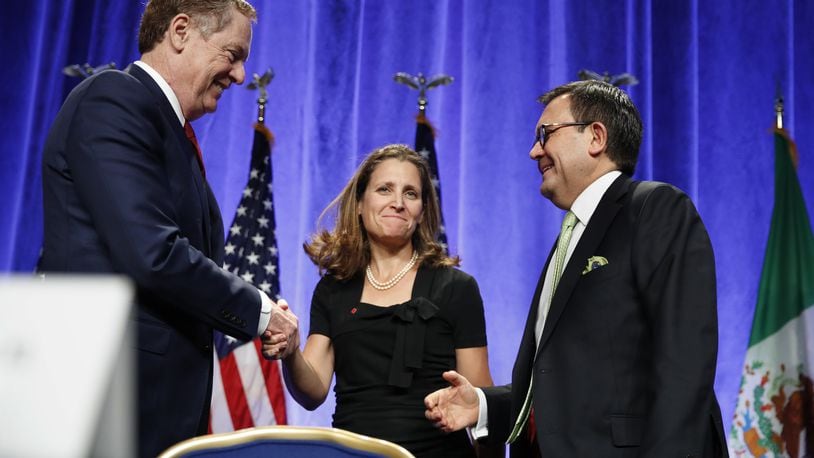The trade agreement — which President Donald Trump vowed to overhaul during the 2016 campaign – has been a lightning rod for Ohio lawmakers, who argue that NAFTA, as it is commonly called, has hurt U.S. manufacturing jobs and done little to protect workers.
RELATED: Brown: ‘This time workers must be at the table’
“NAFTA shipped U.S. manufacturing jobs overseas and put Ohioans out of work,” said Sen. Sherrod Brown, who voted against the agreement as a U.S. House member in 1993. “Renegotiation is an opportunity not only to create a better deal for Ohio workers, but to reset the way we do trade agreements. That means bringing workers to the table, securing strong anti-outsourcing provisions, and making sure we can hold our trading partners accountable if they break the rules.”
Brown, who also authored an editorial for USA Today this week on the trade agreement, released a four-point plan in May aimed at helping the Trump administration secure a deal that would protect workers. He urged Trump to prioritize provisions that would prevent outsourcing and push “Buy America;” to make sure that industry and U.S. workers are not pitted against one another in negotiations; to include workers in negotiations and to build enforcement tools that favor U.S. workers over foreign corporations.
He is not the only Democrat anxious to offer input. Rep. Tim Ryan, D-Niles, said this week that he has watched as people in places like Warren, Ohio, in his district, watched their factories close only to move over the border to Mexico.
“We are working off a model that was created in the early 1990s,” he said. “There were barely websites. At that point in the early 1990s, the internet was in its infancy. So many changes have happened since NAFTA was written.”
Ryan said he is hoping for a structure that “takes into consideration” the things that have changed, be it climate change, displacement of workers “and the lack of and inability of some communities to recover what they’ve lost.”
Not everyone is a NAFTA foe. Canadian Foreign Minister Chrystia Freeland and Mexican Economy Minister Ildefonso Guajardo Villarreal both offered glowing praise for the deal, with Villarreal stating that it “has been a strong success for all parties.”
A U.S. Chamber of Commerce report issued on the 20th anniversary of NAFTA concluded that U.S. trade with Canada and Mexico skyrocketed in the years after the agreement, with Mexico and Canada buying about one-third of U.S. merchandise exports. That report found that trade with Canada and Mexico supports nearly 14 million U.S. jobs, and concluded that 187,968 jobs in Ohio supported by trade with Canada and Mexico are directly attributable to the trade deal.
Those numbers lie in stark contrast to those of Global Trade Watch, a non-profit advocacy organization that has been a critic of the 1993 agreement. In a fact sheet issued earlier this year, the organization found that as of December 2016, the U.S. lost more than 900,000 jobs because of NAFTA.
Sen. Rob Portman, R-Ohio, who backed the agreement as a House member in 1993, argued earlier this year that it was due to be modernized and updated. He said he hoped the final agreement would “expand access to American-made products and strengthen trade enforcement to protect against unfair imports — all of which will create more jobs, boost wages, help our farmers, and improve American manufacturing.”
Lighthizer, meanwhile, said the reworked agreement must address digital trade, service trade, update customs procedures and protect intellectual property. He did say the agreement has been good for U.S. agriculture, making it easier for farmers to send their products overseas.
“The views of the president about NAFTA — which I completely share — are well known, Lighthizer said Wednesday. “I want to be clear that he is not interested in a mere tweaking of a few provisions, and a couple of updated chapters.”
Lighthizer said at least 700,000 Americans have lost their jobs because of NAFTA.
During his 2016 bid for the White House, Trump called NAFTA “the worst trade deal ever made” and “a total and complete disaster” and threatened to pull out of the agreement. But he later agreed to renegotiate and Lighthizer made no mention of Trump’s threats to leave the agreement on Wednesday.
Negotiators will work through this weekend in Washington on a renegotiated pact. They’ll meet in September in Mexico City, meeting after that in Canada.
About the Author
